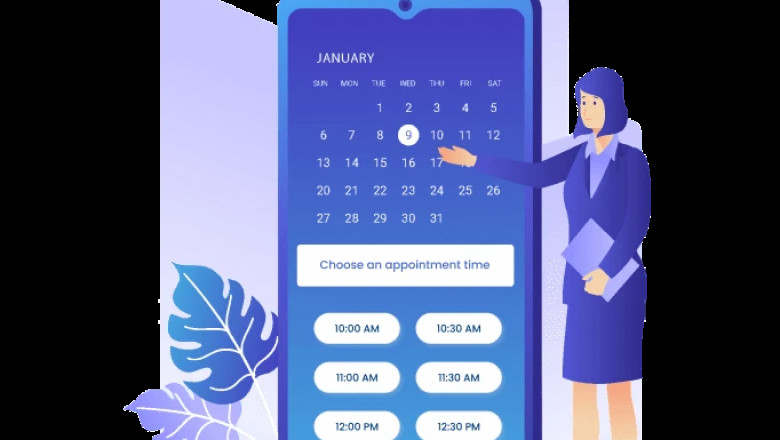views
Missed appointments are a persistent challenge in healthcare. They not only result in lost revenue but also disrupt patient care and create inefficiencies in scheduling. Studies show that no-show rates can range from 10% to 30%, significantly impacting both healthcare providers and patients.
One of the most effective ways to address this issue is through automated reminders in patient appointment scheduling software. These reminders ensure that patients receive timely notifications about their upcoming appointments, reducing the likelihood of forgetfulness, last-minute cancellations, or miscommunication.
This article explores how automated reminders help minimize missed appointments and improve the overall efficiency of healthcare facilities.
1. Reducing Patient Forgetfulness
One of the main reasons for missed appointments is simply forgetting. With busy schedules, many patients overlook their medical visits. Automated reminders solve this issue by:
✅ Sending timely notifications via SMS, email, or phone calls.
✅ Offering multiple reminders—one at the time of booking, another a few days before, and a final reminder on the day of the appointment.
✅ Allowing patients to confirm their attendance directly through the message.
By keeping the appointment top-of-mind, these reminders significantly decrease the number of no-shows.
2. Offering Convenient Rescheduling Options
Sometimes, patients genuinely cannot make their scheduled appointments but forget to reschedule. Automated reminders provide an easy solution by:
✅ Including a reschedule or cancellation link in the message.
✅ Offering alternative time slots for quick rebooking.
✅ Freeing up the appointment slot so another patient can take it.
This ensures that available time slots do not go to waste while giving patients the flexibility to choose a more convenient time.
3. Improving Clinic Efficiency and Reducing Wait Times
Missed appointments create gaps in the schedule, leading to inefficiencies. Automated reminders help by:
✅ Ensuring a steady patient flow so providers' time is utilized efficiently.
✅ Reducing last-minute cancellations, allowing clinics to fill gaps with patients from a waitlist.
✅ Keeping appointment schedules balanced, which minimizes wait times for other patients.
With a more structured appointment system, healthcare facilities operate more smoothly and improve patient satisfaction.
4. Enhancing Patient Engagement and Accountability
When patients receive appointment reminders, they feel more engaged in their healthcare journey. Automated notifications:
✅ Serve as a prompt to prepare for the visit, whether it’s fasting before a test or bringing necessary documents.
✅ Encourage patients to take responsibility for their health by ensuring they don’t miss essential check-ups.
✅ Create a better provider-patient relationship, as consistent communication builds trust.
This leads to better adherence to treatment plans and improved long-term health outcomes.
5. Personalizing Communication for Different Patients
Not all patients prefer the same type of reminder. Some may respond better to text messages, while others may need a phone call. Automated reminder systems allow:
✅ Customization of reminder channels based on patient preference.
✅ Different timing strategies for various patient groups (e.g., elderly patients may require earlier reminders).
✅ Multilingual options to ensure clear communication with diverse patient populations.
By tailoring reminders to individual needs, clinics increase the likelihood of patients showing up for their appointments.
6. Reducing Financial Losses for Healthcare Providers
Missed appointments can lead to substantial revenue loss for healthcare facilities. Automated reminders help mitigate these losses by:
✅ Ensuring higher attendance rates, so providers don’t lose income due to empty slots.
✅ Allowing last-minute cancellations to be reallocated to other patients.
✅ Reducing the need for excessive follow-up calls from administrative staff, lowering operational costs.
By maintaining a full schedule, healthcare providers improve both financial performance and patient care efficiency.
7. Supporting Compliance with Appointment-Based Treatments
Certain medical conditions require regular follow-ups and treatments, such as:
✅ Chronic disease management (e.g., diabetes, hypertension).
✅ Preventive care visits (e.g., vaccinations, screenings).
✅ Post-surgery check-ups and rehabilitation sessions.
Automated reminders ensure that patients stay on track with their treatment schedules, reducing complications from missed visits.
8. Integrating with Telehealth and Virtual Consultations
With the rise of telemedicine, many patients schedule virtual appointments but forget to attend them. Automated reminders play a key role in:
✅ Sending secure links to join telehealth sessions.
✅ Reminding patients about their login credentials and appointment times.
✅ Reducing technical issues by providing instructions in advance.
By ensuring on-time participation, telehealth services remain efficient and accessible.
9. Providing Actionable Insights Through Analytics
Advanced appointment scheduling software collects data on patient attendance trends. This helps healthcare providers:
✅ Identify patients with frequent no-shows and implement targeted interventions.
✅ Optimize reminder timing based on past response rates.
✅ Improve overall scheduling efficiency by adjusting appointment policies.
With data-driven insights, healthcare facilities can continuously refine their appointment management strategies.
10. Enhancing the Overall Patient Experience
A well-structured reminder system contributes to a positive patient experience by:
✅ Reducing frustration caused by missed or forgotten appointments.
✅ Minimizing waiting room congestion, leading to a smoother clinic workflow.
✅ Demonstrating that the healthcare facility values patient time and commitment.
When patients feel supported and well-informed, they are more likely to return for future care.
Conclusion
Automated reminders in patient appointment scheduling software significantly reduce missed appointments, improving efficiency, patient engagement, and financial stability for healthcare providers. By keeping patients informed, offering easy rescheduling options, and ensuring better workflow management, healthcare facilities can enhance overall service delivery.






















Comments
0 comment